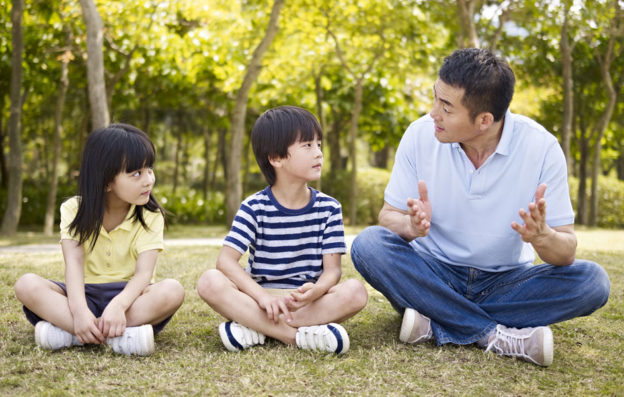As a parent you want you child to grow up to be a thoughtful person, one who has a mindset and a set of values that is as positive as possible. And there are many ways to do that. One of the best, however, may simply to ask them the right questions.
One of the best ways to encourage children to develop a positive mindset and practice it is to talk to them honestly and ask them leading questions. It’s not about telling them what to do; it’s about explaining to them the value of living positively and making the best of what they already have.
Ask your kids these six thoughtful questions to encourage conversation and help them develop a healthy mindset. Some of these questions will also help you to enhance your relationship with your children and bond with them, while learning to better understand them.
1. What five words do you think best describe you?
This question encourages children in the direction where they get to know themselves better and have an idea of what other people think of them. It gives your child a good frame of reference on where she stands in her small world, which is important for molding the right self-image.
2. What do you love doing that makes you feel happiest?
Some children will say playing video games makes them feel happiest, which is actually fine. Recent studies show that there are actually many psychological benefits of gaming. Others will say hanging out with their friends. Or playing with their pets. Some may even say spending time with you.
It doe not actually really matter what they say. The point of this question is to direct your child’s attention to the things that make him feel happy and open his eyes to the fact that he can actively choose to increase time spent in those activities that bring him joy. Hopefully, this will teach him to pursue activities, hobbies and even careers that make him happiest later on in life.
3. What do you know how to do that you can teach others?
This question is about teaching kids that life is not all about you, your own interests and what you can get from others. Life is about us all and what we can do to help each other.
The question helps your child feel empowered and valued. It reminds her that she is special and she has something to offer. When your child feels special and knows she has something to offer, it builds self-confidence and self-worth, and also encourages learning.
4. What is the most wonderful/worst thing that ever happened to you?
Life is not all sunshine and rainbows, but neither is it all gloom and doom. Life is a mix of good and bad experiences, and that’s what makes it so exciting. Kids need to understand this fact early so they are mentally prepared for life. The question is about directing that awareness. It helps your child realize (from her own experience) that bad things don’t last forever.
5. Of all the things you are learning, what do you think will be the most useful when you are an adult?
This question is about reminding children that they will be adults one day and that they need to start living purposely. It is also about sensitizing your kids to where their conscience is calling them and what they should be doing right now to get there. When your child understands the value of what he is learning and how it can help him in the future, it can motivate him to truly enjoy things like reading, studying and learning.
6. What are you most grateful for?
This question encourages kids to count their blessings and look at the brighter side of life. It is about teaching kids to put things into perspective, look around and appreciate what they have in life no matter how small, including family, friends, a good school and food.
This, in turn, can contribute to your child’s overall happiness, as there is a strong correlation between gratitude and happiness.
7 What do you think your life will be like in the future?
This question also directs children to think about the future and plan for it. It will help your child to ponder on what he wants to be when he grows up and how he’d like the world to be like when he’s older. You will, in turn, discover what your child is moving toward and see how you can help him realize that dream from the conversation you have around this question.





